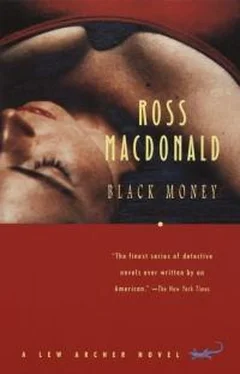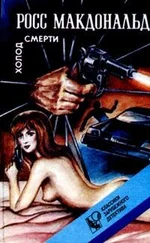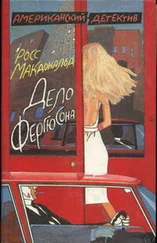“Francis Martel.”
“That’s interesting.”
Bosch didn’t tell me why. “I did see the report of that shooting. Wasn’t it supposed to be a gangster killing?”
“It was supposed to be.”
“You sound dubious.”
“I’m getting more and more that way.”
Bosch had stopped eating. He showed no further interest in his soup. When his minute steak arrived he cut it meticulously into small pieces which he failed to eat.
“I seem to be asking most of the questions,” he said. “I was interested in Pedro Domingo. He had a good mind, rather disordered but definitely brilliant. Also he had a lot of life.”
“It’s all run out now.”
“Why was he using an alias?”
“He stole a pile of money and didn’t want to be caught. Also he wanted to impress a girl who was hipped on French. He represented himself as a French aristocrat named Francis Martel. It sounds better than Pedro Domingo, especially in Southern California.”
“It’s almost authentic, too.” Bosch said quietly.
“Authentic?”
“At least as authentic as most genealogical claims. Pedro’s grandfather, his mother’s father, was named Martel. He may not have been an aristocrat, exactly, but he was an educated Parisian. He came over from France as a young engineer with La Compagnie Universelle .”
“I don’t know French, professor.”
“ La Compagnie Universelle du Canal Interocéanique de Panama is the name de Lesseps gave to his canal-building company – a big name for an enormous flop. It went broke somewhere before 1890 and Grand-père Martel lost his money. He decided to stay on in Panama. He was an amateur ornithologist, and the flora and fauna intrigued him.
“Eventually he went more or less native, and spent his declining years with a girl in one of the villages. Pedro said she was descended from the first Cimarrones, the escaped slaves who fought with Francis Drake against the Spaniards. He claimed to be a direct descendant of Drake through her – that would explain the name Francis – but I think this time he was spinning a pure genealogical fantasy. Pedro went in rather heavily for fantasy.”
“It’s dangerous,” I said, “when you start to act it out.”
“I suppose it is. Anyway, the village girl was Pedro’s maternal grandmother. His mother and Pedro both took the name Domingo from her.”
“Who was Pedro’s father?”
“He didn’t know. I gathered that his mother didn’t, either. She lived a disorganized life, to put it mildly. But she did keep alive the grandfather’s tradition, even long after the old man died.
“There’s a French tradition in Panama, anyway. Pedro’s mother taught him French along with Spanish. They read together out of Grand-père ’s books. The old man had been fairly literate – his library ranged from La Fontaine and Descartes to Baudelaire – and Pedro got quite a decent education in French. You can understand why the language obsessed him. He was a slum boy, with Indian and slave blood in his veins as well as French. His Frenchness was his only distinction, his only hope of distinction.”
“How can you possibly know all this, professor?”
“I spent some time with the boy. I thought he had promise, perhaps very brilliant promise, and he was keen to talk with someone who knew France. I spent a year there on a traveling fellowship,” Bosch added in a depreciatory tone. “Also, in my advanced French composition courses I use a device – which incidentally I borrowed from Taps – the device of having my students write an essay, in French, explaining why they’re studying the language. Pedro came up with a stunning piece about his grandfather and la gloire – the glory of France. I gave him an A-plus on it, my first in several years. It’s the source of most of what I’ve been telling you.”
“I don’t know the language,” I said, “but I’d certainly like to see that document.”
“I gave it back to Pedro. He told me he sent it home to his mother.”
“What was her name, do you know?”
“ Secundina Domingo . She must have been her mother’s second daughter.”
“Judging by her last name, she never married.”
“Apparently she didn’t. But there were men in her life,” Bosch said dryly. “One night I gave Pedro too much wine and he told me about the American sailors who used to come home with her. This was during the war, when he was still quite young. He and his mother had only the one room, and only one bed in the room. He had to wait on the landing when she had visitors. Sometimes he waited out there all night.
“He was devoted to his mother, and I think that experience pushed him a little over the edge. The night I’m talking about, when he got high on my vin ordinaire , he went into a wild oration about his country being the trampled crossroads of the world and he himself the essence of its mud, Caucasian, Indian, Negro. He seemed to identify himself with the Black Christ of Nombre de Dios, which is a famous Panamanian religious statue.”
“He had Messianic delusions?”
“If he had, I wouldn’t know. I’m not a psychiatrist. I think Pedro really was a ruined poet, a symbolizing idealizing soul who inherited too many problems. I admit he had some pretty weird ideas, but even the weird ones made a kind of sense. Panama was more than a country to him, more than a geographical link between North and South America. He thought it represented a basic connection between the soul and the body, the head and the heart – and that the North Americans broke the connection.”
He added: “And now we’ve killed him.”
“We?”
“We North Americans.”
He toyed with the dark meat congealing on his plate. I looked out toward the mountains. Above them a jet had cut a white wound in the sky.
I was getting a picture of Allan Bosch, which I liked. He differed from an older type like Tappinger, who was so wrapped up in himself and his work that it made him a social eccentric. Bosch seemed genuinely concerned with his students. I said something to this effect.
He shrugged off his pleasure in the compliment. “I’m a teacher. I wouldn’t want to be anything else.”
After a pause, which was filled with the interwoven noise of the students around us, he said: “I took it hard when Pedro had to leave here. He was just about the most interesting student I ever had here or at Illinois. I’ve only taught the two places.”
“Your friend Tappinger says the Justice Department was after him.”
“Yes. Pedro entered the country illegally. He had to leave Long Beach and then he had to leave here, one jump ahead of the Immigration men. As a matter of fact, I tipped him that they were making inquiries about him. I’m not ashamed of it, either,” he said with a half-smile.
“I won’t turn you in, Dr. Bosch.”
His smile became wry and defensive. “I’m afraid I’m not a Ph.D. I failed comprehensives at Illinois. I could have tried them again, I suppose, but there wasn’t much point in it.”
“Why not?”
“Taps had already left. I was one of his special protégés , and I inherited a certain amount of ill will. What happened to him did nothing for my morale, either. I thought if it could happen to one of the most promising scholars in my field, it could happen to anybody.”
“What happened to him at Illinois?”
Bosch went into a tight-tipped silence. I waited, and changed my angle of approach: “Is he still a leading scholar in your field?”
“He would be if he had a decent chance. But he gets no time for his work, and it’s driving him crazy. When the grants are handed out, they pass him over. He can’t even get a promotion in a bush league school like Montevista.”
Читать дальше







